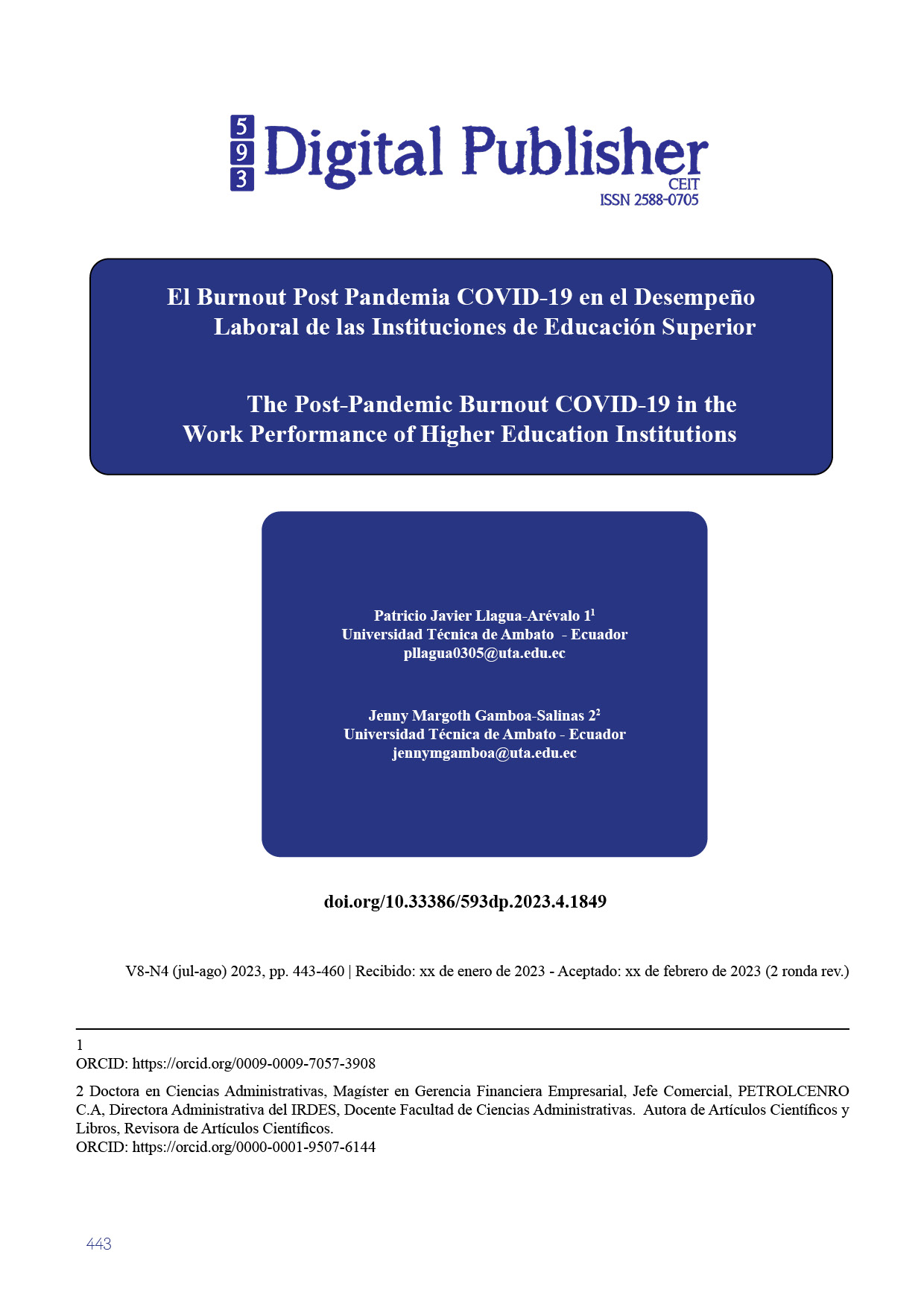The Post-Pandemic Burnout COVID-19 in the Work Performance of Higher Education Institutions
Main Article Content
Abstract
Burnout is a state of emotional exhaustion, depersonalization and low personal satisfaction that occurs when a person experiences a chronically excessive workload or job stress, which was increased due to the adaptation of teleworking in higher education institutions, in which, the professors used new methods to adapt to the new education methodology, which brought with it stress, anxiety and various factors that influence the work behavior of each member of the university community. Methodology: Quantitative research was used because numerical quantities obtained through a survey were used, for this, a sample of 5091 people made up of personnel from the Technical University of Ambato, Universidad de los Andes (Uniandes) and Indoamérica Technology University, in addition, a bibliographic review was carried out by digital repositories such as Publimed, Scopus, Redalyc, etc., to order all the topics that intervene in this research. Results: 45% of the surveyed sample considers that due to the pandemic the working hours have increased, in addition, 41% of the sample considers that the origin of Burnout is due to insufficient emotional support provided by the human resources department of the Higher Education Institutions. Conclusions: Organizational culture strategies to combat burnout should focus on providing emotional support, reducing work activities and above all providing administrative measures to manage stress and workload.
Keywords: Burnout, Culture, Organizational, Research, Telecommuting.
Downloads
Article Details

This work is licensed under a Creative Commons Attribution-NonCommercial-ShareAlike 4.0 International License.
1. Derechos de autor
Las obras que se publican en 593 Digital Publisher CEIT están sujetas a los siguientes términos:
1.1. 593 Digital Publisher CEIT, conserva los derechos patrimoniales (copyright) de las obras publicadas, favorece y permite la reutilización de las mismas bajo la licencia Licencia Creative Commons 4.0 de Reconocimiento-NoComercial-CompartirIgual 4.0, por lo cual se pueden copiar, usar, difundir, transmitir y exponer públicamente, siempre que:
1.1.a. Se cite la autoría y fuente original de su publicación (revista, editorial, URL).
1.1.b. No se usen para fines comerciales u onerosos.
1.1.c. Se mencione la existencia y especificaciones de esta licencia de uso.
References
Açikgöz, Ö., & Günay, A. (2020). The early impact of the Covid-19 pandemic on the global and Turkish economy. Turkish Journal of Medical Sciences, 50(SI-1), 520–526. https://doi.org/10.3906/SAG-2004-6
Ahmad. (2010). Work-Family Conflict among Junior Physicians: Its Mediating Role in the Relationship between Role Overload and Emotional Exhaustion. Journal of Social Sciences, 6(2), 265–271. https://doi.org/10.3844/JSSP.2010.265.271
Ali, S., Peters, L. D., Khan, I. U., Ali, W., & Saif, N. (2020). Organizational Learning and Hotel Performance: The Role of Capabilities’ Hierarchy. International Journal of Hospitality Management, 85. https://doi.org/10.1016/J.IJHM.2019.102349
Almukhamedova, O. (2020). Tourism industry perspectives in the context of the COVID-19 pandemic based on the sustainable development concept. International Journal of Criminology and Sociology, 9, 1237–1251. https://doi.org/10.6000/1929-4409.2020.09.143
Bąk-Sosnowska, M., Gruszczyńska, M., & Tokarz, A. (2021). Well-being of nurses and working conditions—Are polish nurses different from doctors and midwives in terms of professional quality of life? Nursing Open, 8(1), 87–95. https://doi.org/10.1002/NOP2.606
Barreiro, C. A., & Treglown, L. (2020). What makes an engaged employee? A facet-level approach to trait emotional intelligence as a predictor of employee engagement. Personality and Individual Differences, 159. https://doi.org/10.1016/J.PAID.2020.109892
Batista Sánchez, E., & Rivero González, A. (2022). Turismo y covid-19. Análisis de la productividad científica en Scopus. Turismo y Sociedad, 31, 25–47. https://doi.org/10.18601/01207555.N31.01
Bocharov, V. v., & Shishkova, A. M. (2021). The burnout of informal caregivers: Contemporary perceptions and research perspectives. Counseling Psychology and Psychotherapy, 29(1), 149–164. https://doi.org/10.17759/CPP.2021290109
Bunout, E. (2021). Grasping the Anti-Modern Discourse on Europe in the Swiss Digitised Press, or can Text Mining Generate a Research Corpus from an Article Collection? Journal of Open Humanities Data, 7(0), 21. https://doi.org/10.5334/JOHD.37
Burić, I., & Macuka, I. (2018). Self-Efficacy, Emotions and Work Engagement Among Teachers: A Two Wave Cross-Lagged Analysis. Journal of Happiness Studies, 19(7), 1917–1933. https://doi.org/10.1007/S10902-017-9903-9
Butakor, P. K., Guo, Q., & Adebanji, A. O. (2021a). Using structural equation modeling to examine the relationship between Ghanaian teachers’ emotional intelligence, job satisfaction, professional identity, and work engagement. Psychology in the Schools, 58(3), 534–552. https://doi.org/10.1002/PITS.22462
Butakor, P. K., Guo, Q., & Adebanji, A. O. (2021b). Using structural equation modeling to examine the relationship between Ghanaian teachers’ emotional intelligence, job satisfaction, professional identity, and work engagement. Psychology in the Schools, 58(3), 534–552. https://doi.org/10.1002/PITS.22462
Chao, Y. C. (2018). Organizational learning and acquirer performance: How do serial acquirers learn from acquisition experience? Asia Pacific Management Review, 23(3), 161–168. https://doi.org/10.1016/J.APMRV.2017.07.001
Dall’Ora, C., Ball, J., Reinius, M., & Griffiths, P. (2020). Burnout in nursing: A theoretical review. Human Resources for Health, 18(1). https://doi.org/10.1186/S12960-020-00469-9
De Hert, S. (2020). Burnout in healthcare workers: Prevalence, impact and preventative strategies. Local and Regional Anesthesia, 13, 171–183. https://doi.org/10.2147/LRA.S240564
Drigas, A., & Papoutsi, C. (2019). Emotional Intelligence as an Important Asset for HR in Organizations: Leaders and Employees. International Journal of Advanced Corporate Learning (IJAC), 12(1), 58. https://doi.org/10.3991/IJAC.V12I1.9637
Edilia Palacios Nava, M., & del Pilar Paz Román, M. (n.d.). El Síndrome de Burnout: una enfermedad laboral de los profesionales de la salud y la pandemia por COVID-19 #.
Edú‐Valsania, S., Laguía, A., & Moriano, J. A. (2022a). Burnout: A Review of Theory and Measurement. International Journal of Environmental Research and Public Health, 19(3). https://doi.org/10.3390/IJERPH19031780
Edú‐Valsania, S., Laguía, A., & Moriano, J. A. (2022b). Burnout: A Review of Theory and Measurement. International Journal of Environmental Research and Public Health, 19(3). https://doi.org/10.3390/IJERPH19031780
Edú‐Valsania, S., Laguía, A., & Moriano, J. A. (2022c). Burnout: A Review of Theory and Measurement. International Journal of Environmental Research and Public Health, 19(3). https://doi.org/10.3390/IJERPH19031780
Elghazally, S. A., Alkarn, A. F., Elkhayat, H., Ibrahim, A. K., & Elkhayat, M. R. (2021). Burnout impact of covid-19 pandemic on health-care professionals at Assiut University Hospitals, 2020. International Journal of Environmental Research and Public Health, 18(10). https://doi.org/10.3390/IJERPH18105368
Frajerman, A., Morvan, Y., Krebs, M. O., Gorwood, P., & Chaumette, B. (2019). Burnout in medical students before residency: A systematic review and meta-analysis. European Psychiatry, 55, 36–42. https://doi.org/10.1016/J.EURPSY.2018.08.006
Galanis, P., Vraka, I., Fragkou, D., Bilali, A., & Kaitelidou, D. (2021). Nurses’ burnout and associated risk factors during the COVID-19 pandemic: A systematic review and meta-analysis. Journal of Advanced Nursing, 77(8), 3286–3302. https://doi.org/10.1111/JAN.14839
García Aráoz, R., Lucero Bringas, M. de los A., & Ribbert, E. (2022). La Gestión del Desempeño en la Empresa Familiar. Ciencias Administrativas, 109. https://doi.org/10.24215/23143738E109
Gavaldón Oseki, E., & Ambrosy Velarde, I. L. (2023). Educación para el bien común, o la educación como bien común. Revista Latinoamericana de Estudios Educativos, 53(1), 7–14. https://doi.org/10.48102/RLEE.2023.53.1.538
George, O. J., Okon, S. E., & Akaighe, G. (2022). Emotional intelligence and work engagement: a serial mediation model. Journal of Organizational Effectiveness, 9(2), 193–211. https://doi.org/10.1108/JOEPP-02-2021-0025
Gil-Monte, P. R. (2002). Influencia del género sobre el proceso de desarrollo del síndrome de quemarse por el trabajo (Burnout) en profesionales de enfermería. Psicologia Em Estudo, 7(1), 3–10. https://doi.org/10.1590/S1413-73722002000100003
Gomes, G., Seman, L. O., Berndt, A. C., & Bogoni, N. (2022). The role of entrepreneurial orientation, organizational learning capability and service innovation in organizational performance. Revista de Gestao, 29(1), 39–54. https://doi.org/10.1108/REGE-11-2020-0103
Griffith, A. K. (2022a). Parental Burnout and Child Maltreatment During the COVID-19 Pandemic. Journal of Family Violence, 37(5), 725–731. https://doi.org/10.1007/S10896-020-00172-2
Griffith, A. K. (2022b). Parental Burnout and Child Maltreatment During the COVID-19 Pandemic. Journal of Family Violence, 37(5), 725–731. https://doi.org/10.1007/S10896-020-00172-2
Henrique Amorim, F. M. C. M. (2021). EMPREENDEDORISMO: ¿una forma de americanismo contemporáneo? Caderno CRH, 34. https://www.redalyc.org/journal/3476/347669841018/347669841018.pdf
Jácome, C., Seixas, A., Serrão, C., Teixeira, A., Castro, L., & Duarte, I. (2021). Burnout in Portuguese physiotherapists during COVID-19 pandemic. Physiotherapy Research International, 26(3). https://doi.org/10.1002/PRI.1915
Kelly, L. A., Gee, P. M., & Butler, R. J. (2021). Impact of nurse burnout on organizational and position turnover. Nursing Outlook, 69(1), 96–102. https://doi.org/10.1016/J.OUTLOOK.2020.06.008
Koutsimani, P., Montgomery, A., & Georganta, K. (2019). The relationship between burnout, depression, and anxiety: A systematic review and meta-analysis. Frontiers in Psychology, 10(MAR). https://doi.org/10.3389/FPSYG.2019.00284
Leal Paredes, S. M. (2022). Inteligencia Emocional y Compromiso Laboral en las MiPymes de Ecuador. Ciencias Administrativas, 116. https://doi.org/10.24215/23143738E116
Macía-Rodríguez, C., Martín Iglesias, D., Moreno Diaz, J., Aranda Sánchez, M., Ortiz Llauradó, G., Montaño Martínez, A., Muñoz Muñoz, C., López Reboiro, M. L., & González-Munera, A. (2020). Burnout syndrome in internal medicine specialists and factors associated with its onset. Revista Clínica Española, 220(6), 331–338. https://doi.org/10.1016/j.rce.2019.10.009
Martínez Aragón, C. L. (2022a). Una revisión sistemática de la literatura del aprendizaje organizacional y el desempeño. Visión de Futuro, 27, No 1 (Enero-Junio), 1–23. https://doi.org/10.36995/J.VISIONDEFUTURO.2023.27.01.001.ES
Martínez Aragón, C. L. (2022b). Una revisión sistemática de la literatura del aprendizaje organizacional y el desempeño. Visión de Futuro, 27, No 1 (Enero-Junio), 1–23. https://doi.org/10.36995/J.VISIONDEFUTURO.2023.27.01.001.ES
Martínez Aragón, C. L., Arellano González, A., & Lagarda Leyva, E. A. (2021). Cultura Organizacional y Competitividad de las Empresas Restauranteras y Hoteleras de Sonora, México. Ciencias Administrativas, 095. https://doi.org/10.24215/23143738E095
Maslach, C., & Leiter, M. P. (2020). Understanding the burnout experience: Recent research and its implications for psychiatry. World Psychiatry, 15(2), 103–111. https://doi.org/10.1002/WPS.20311
McCance-Katz, E. F. (2018). The Substance Abuse and Mental Health Services Administration (SAMHSA): New Directions. Psychiatric Services (Washington, D.C.), 69(10), 1046–1048. https://doi.org/10.1176/APPI.PS.201800281
Miranda-Novales, M. G., & Villacís-Keever, M. Á. (2017). The research protocol VI: How to choose the appropriate statistical test. Inferential statistics. Revista Alergia México, 64(3), 364–370. https://doi.org/10.29262/RAM.V64I3.304
Molyneux, C. (2022). Burnout. Wounds UK, 18(3), 33–35. https://doi.org/10.4018/IJSEM.2020070102
Parreño Urquizo, Á. (2019). Metodología de investigación en salud ESPOCH. http://cimogsys.espoch.edu.ec/direccion-publicaciones/public/docs/books/2019-09-17-224845-metodolog%C3%ADa%20de%20la%20investigaci%C3%B3n%20en%20salud-comprimido.pdf
Pérez, J. P. (2013). Efecto del burnout y la sobrecarga en la calidad de vida en el trabajo. Estudios Gerenciales, 29(129), 445–455. https://doi.org/10.1016/J.ESTGER.2013.11.010
Rahman, R., Ghesquiere, A., Spector, A. Y., Goldberg, R., & Gonzalez, O. M. (2020). Helping the Helpers: A Photovoice Study Examining Burnout and Self-Care among HIV Providers and Managers. Human Service Organizations Management, Leadership and Governance, 44(3), 244–265. https://doi.org/10.1080/23303131.2020.1737293
Schaufeli, W. B., Desart, S., & de Witte, H. (2020). Burnout assessment tool (Bat)—development, validity, and reliability. International Journal of Environmental Research and Public Health, 17(24), 1–21. https://doi.org/10.3390/IJERPH17249495
Schlak, A. E., Aiken, L. H., Chittams, J., Poghosyan, L., & McHugh, M. (2021). Leveraging the work environment to minimize the negative impact of nurse burnout on patient outcomes. International Journal of Environmental Research and Public Health, 18(2), 1–15. https://doi.org/10.3390/IJERPH18020610
Senecyt. (2022). Indicadores de educación superior, ciencia, tecnología e innovación. 15–18.
Serrano Gisbert, M. aF. (2002). Estrés laboral en el personal sanitario. Fisioterapia, 24, 33–42. https://doi.org/10.1016/S0211-5638(01)73016-7
Sierra Carpio, D. (2018). La relación del emprendimiento corporativo, la orientación al aprendizaje y el compromiso organizacional con el desempeño organizacional: un acercamiento teórico. NovaRUA, 10(17), 25–36. https://doi.org/10.20983/NOVARUA.2018.17.2
Van Dam, A. (2021a). A clinical perspective on burnout: diagnosis, classification, and treatment of clinical burnout. European Journal of Work and Organizational Psychology, 30(5), 732–741. https://doi.org/10.1080/1359432X.2021.1948400
Van Dam, A. (2021b). A clinical perspective on burnout: diagnosis, classification, and treatment of clinical burnout. European Journal of Work and Organizational Psychology, 30(5), 732–741. https://doi.org/10.1080/1359432X.2021.1948400
Yates, S. W. (2020). Physician Stress and Burnout. American Journal of Medicine, 133(2), 160–164. https://doi.org/10.1016/J.AMJMED.2019.08.034
Yıldırım, M., & Solmaz, F. (2022). COVID-19 burnout, COVID-19 stress and resilience: Initial psychometric properties of COVID-19 Burnout Scale. Death Studies, 46(3), 524–532. https://doi.org/10.1080/07481187.2020.1818885



